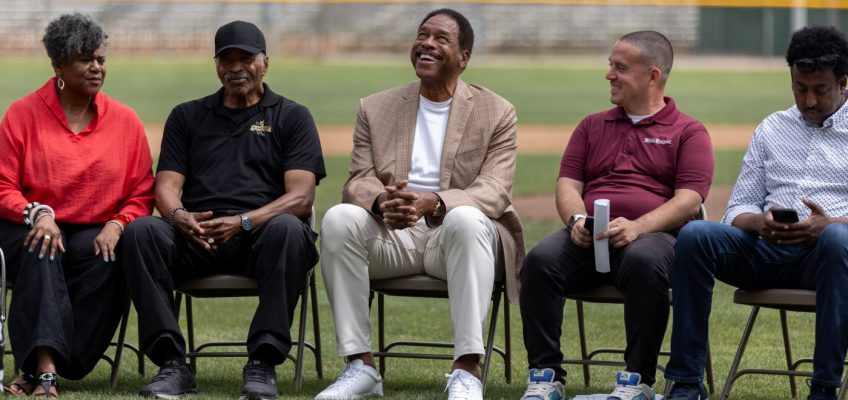Baseball hall of famer Dave Winfield, center, smiles during his legacy celebration at Toni Stone Stadium in St. Paul on Saturday, July 19, 2025. (Bennett Moger / Pioneer Press)
Dozens of baseball fans and community members flocked to Toni Stone Field on Saturday to honor baseball great Dave Winfield, the former St. Paul playground legend who became a major league hall of famer.
During a ceremony recognizing Winfield’s athletic and philanthropic successes, St. Paul Mayor Melvin Carter announced that a statue of Winfield would be placed at the St. Paul baseball field in the spring to remind young athletes of their own potential for greatness.
Baseball hall of famer and St. Paul native Dave Winfield gives a speech during his legacy celebration at Toni Stone Stadium in St. Paul on Saturday, July 19, 2025. (Bennett Moger / Pioneer Press)
“St. Paul, all of you mean a great deal to me,” Dave Winfield said. “And I’m totally honored that you would think of putting up some permanent recognition to keep that legacy alive, to motivate other people after me and tell them, ‘Yeah, you can do it, too. Yeah, you come from St. Paul, Minnesota.’ It’s not where you’re from, it’s where you’re going. And to have that permanent statue and legacy … it’s one of the greatest honors of my life.”
A star pitcher and basketball player at the University of Minnesota, Winfield became one of baseball’s great right fielders over a 22-year career playing for San Diego, the New York Yankees, Toronto Blue Jays, Twins and, briefly, Cleveland. He was an all-star 12 times, and won seven Gold Glove Awards.
In addition to baseball’s Hall of Fame (2001), Winfield is a member of the Gophers and Central High School halls. He has written several books and articles on baseball, and his “Ask Dave” column ran in the Pioneer Press from 1993-94.
“This is a very powerful day,” said Anika Bowie, city council member representing Ward 1 in St. Paul. “And this neighborhood that raised legends continues to make history.”
The Winfield family, which includes Dave’s brother, Steve — a fixture in St. Paul amateur athletics as a player, coach and game official — is “Rondo Royalty,” Bowie said. “They represent the best of us. Rooted, resilient, and relentless in their beliefs, in our young people, in our families, and in investing in what has invested in us.”
“Their roots run deep here and their values reflect everything that his neighbors stands for — perseverance, leadership and love for a community,” she said. “They showed us what’s possible when talent meets opportunity and when family and neighborhoods walk beside you every step of that way.”
Winfield is more than just a “baseball icon,” she said. “He’s a Rondo kid … who turned grit into greatness, a young boy who sharpened his skills on the field and was lifted up by a community that believed in him. And now he gives back to that same community 10 times over.”
Along with the installation of the statue, Carter announced that the Toni Stone baseball field would be “renewed” and that a Hall of Fame plaza was going to be constructed at the location to honor Winfield and the other St. Paul hall of famers: Paul Molitor, Jack Morris and Joe Mauer. All four grew up at different times, but within miles of one another in the city.
Baseball hall of famers Dave Winfield, left, and Joe Mauer, right, congratulate each other during the Dave Winfield Legacy Celebration at Toni Stone Stadium in St. Paul on Saturday, July 19, 2025. A statue of each of them, in addition to two other St. Paul baseball legends, will be installed in the Dunning Sports Complex to celebrate the path they have paved for St. Paul baseball. (Bennett Moger / Pioneer Press)
“We’re in the presence of royalty today,” Carter noted, acknowledging the other recognizable members of the crowd, such as Mauer, longtime baseball coach Bill Peterson and former Vikings receiver — and King Boreas — Leo Lewis.
Growing up, Carter said, he and his friends said they knew that Winfield and Peterson were from their community and he remembered the day Winfield swung the bat and made his 3,000th hit.
“And that changes our perspective of where we can go from these spaces,” Carter said, noting that out of some 20,000 people who have played Major League Baseball, only 33 have had accumulated as many as 3,000 hits, including Molitor. “So, when we say that Dave Winfield is literally one of the best to ever do it, that is not hyperbole at all. That is just statistical facts.
“And the only thing better than coming from this community and going on to do great things is coming back to the community to do great things.”
From the early stages of his baseball career, Winfield has been invested in the community and neighborhood.
“They say, ‘Don’t forget where you came from,’ and we’re here to honor and celebrate someone who literally never forgot where he came from,” Carter said.
St. Paul Parks and Recreation Director Andy Rodriguez called Winfield a “hometown hero who represents the heart, soul and strength of” St. Paul.
“Baseball is woven into the history of St. Paul. It’s more than a game here. It’s part of our identity,” Rodriguez added. “St. Paul has always been a place where young people have found themselves through sports and recreation, and found community through teams. And no one embodies that story more than Dave Winfield.”
Winfield retired with 3,110 hits, the 3,000th hit as a member of the hometown Twins in 1993. The year before, he won the World Series with the Blue Jays.
“Even more inspiring is what he’s done beyond the field,” Rodriguez said. “He’s never forgotten where he came from. He’s invested in youth, in community, and in opportunity and in building programs that have lifted up thousands of young people across the country and especially here at home.”
In St. Paul, Rodriguez noted, all athletic programs for children are free “because we believe every kid deserves the chance to play, deserves the chance to grow and belong.”
Dave St. Peter, longtime president of the Minnesota Twins now working with them as a consultant, said that while Winfield was a “unique player,” his athletic prowess is only part of his legacy.
“Dave was active in the community before it was in vogue for players to be active in the community,” he said. “The Winfield Foundation had been established many, many years before he ever showed up in a Twins uniform. And in my role at the time, it was a blessing to (tell other players) … ‘Dave is the model, guys.’”
“I had a really wonderful blessed career with the Twins, and I got to do a lot of really cool things,” St. Peter said, “But one of the things I’m most proud of is working with Dave Winfield and championing his community activities.”
Carter said he went to college on a Winfield scholarship and that he is the parent of a student who was a scholarship recipient.
Dave Winfield, right, hugs his brother Steve Winfield, left, before giving his speech during the Dave Winfield Legacy Celebration at Toni Stone Stadium in St. Paul on Saturday, July 19, 2025. (Bennett Moger / Pioneer Press)
Steve Winfield also spoke at the ceremony, saying that when he and his brother were growing up, raised by a single mom without much money, they always tried to find an extra can of food or something to help when a new member of their baseball team showed up and didn’t have “much of anything.”
And his brother noted, Winfield went on to help others as one of the first professional athletes to start a foundation.
“Now, just about all the athletes get a contract and say, ‘OK, I’ll do this, I’ll do that,’” he said. “But David was doing it before it was a popular thing to do, so I think that’s a thing I’m most proud of.”
Playing sports is about more than just the sport, Carter said.
“You learn how to connect with teammates. You learn how to work hard through struggle. You learn how to take and receive coaching. You build relationships with your teammates, you build relationships with adults who care about you,” he said.
Winfield said he and older brother Steve were “very fortunate” to grow up in a community where sports and the park and recreation were important to the community. They loved baseball from a young age.
“We would play and we didn’t need nine guys and a coach and time for practice,” he said. “We’d get a rubber ball, a tennis ball — any kind of ball — and play off the steps, off the back of the church, in the street, in the alleys, anywhere. Baseball just really took ahold of us.”
Steve would fall asleep at night dreaming of making the best catch ever, Winfield said, while he would fall asleep thinking about how hard he wanted to hit a baseball.
“I wanted to hit the ball so hard that a guy would reach out and the ball would already be past him,” he said.
In a special article he wrote for the Pioneer Press on the occasion of Target Field hosting the All-Star Game in 2014, Winfield said he began playing baseball at age 8, and knew by the age of 12 that he wanted to play professionally.
“The skills and lessons I learned in St. Paul were the foundation of a career I could barely imagine as a youth,” he wrote.
More than anything, Winfield said Saturday, he wanted to thank “all the teachers, the coaching, the community members who poured something into me to help make me who I am.”
He said he had no idea that the future mayor of St. Paul would benefit from his foundation. “And all the outstanding things he’s done. I didn’t know. But it was always about giving back. It was just a natural thing for me.”
Obituary: Wendi Ward, Practical Goods owner, believed in recycling, community
Review: Yacht Club festival kicks off second year with energetic Friday lineup
St. Paul to host 2028 Transplant Games
St. Paul: Northern Iron Foundry files second lawsuit against MPCA
St. Paul Fire Chief Butch Inks appointed to second term




